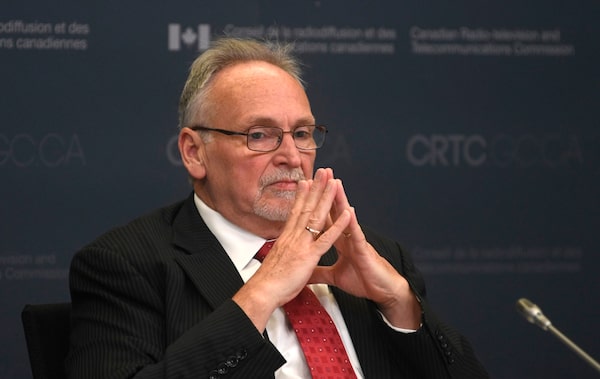
CRTC Chair Ian Scott is seen at the start of the first day of hearings on mobile wireless service, Feb. 18, 2020 in Gatineau, Que.Adrian Wyld/The Canadian Press
An industry group representing independent internet service providers has filed an application with Canada’s telecom regulator challenging the impartiality of its chair, Ian Scott, and requesting that he recuse himself from files related to competition between large internet providers and smaller ones.
The request is related to a controversial reversal last year by the Canadian Radio-television and Telecommunications Commission (CRTC) of its own 2019 decision to lower the wholesale rates that large phone and cable companies can charge smaller internet service providers (ISPs) for access to the larger companies’ networks.
The Competitive Network Operators of Canada (CNOC) is asking for Mr. Scott to recuse himself from deciding any matters relating to internet competition until the Federal Court rules on TekSavvy Solutions Inc.’s appeal of the ruling that reversed the wholesale broadband rates decision.
CNOC’s application, filed Thursday, says Mr. Scott’s recusal is “crucial to restore public and stakeholder confidence in the CRTC, to protect it from further institutional damage, and to avoid the taint of bias.”
A spokesperson for the CRTC said the commission does not comment on active files.
Mr. Scott, who worked for Telus Corp. and satellite operator Telesat before being appointed CRTC chair in 2017, faced criticism after the May, 2021, reversal for allegedly being biased in favour of large telecoms. Some of his critics have pointed to a December, 2019, meeting at an Ottawa pub between Mr. Scott and Mirko Bibic, who at the time was chief operating officer of BCE Inc. and is now the company’s chief executive.
Mr. Scott told the Toronto Star in a recent interview that he broke no rules during the meeting. He was simply going for a beer with someone he has known “for many years,” he said, and Mr. Bibic recorded the meeting in the lobbyist registry.
Geoff White, executive director and general counsel of CNOC, told The Globe it’s problematic that Mr. Scott “has admitted he’s friends with the CEO of Bell.”
“That in and of itself presents a very serious potential conflict of interest,” Mr. White said.
In order to encourage competition in the internet market, the CRTC requires larger providers to sell network access to smaller players at regulated rates. The independent ISPs then sell internet service to their own customers.
In August, 2019, the telecom regulator slashed the rates that the large telecoms can charge and ordered them to make substantial retroactive payments – at the time totalling an estimated $325-million, according to court documents – to independent ISPs to compensate them for the higher interim rates that had been in place since 2016.
The ruling prompted legal and regulatory challenges from the large telecoms, who argued the new rates were too low and would stifle network investments. Both the Federal Court of Appeal and the federal cabinet declined to overturn the CRTC’s ruling, leaving the final decision up to the regulator itself.
After a lengthy review, the commission reversed its 2019 decision, saying that it found significant errors. It opted to largely maintain the interim rates that have been in place since 2016, with some adjustments.
“The smaller players are hurting very badly as a result of the CRTC dismantling pro-competitive measures, and we don’t have faith at the moment that the CRTC is taking this matter seriously any more,” Mr. White said.
“Ultimately, it’s consumers that are going to suffer when the smaller players are gone,” he added.
Your time is valuable. Have the Top Business Headlines newsletter conveniently delivered to your inbox in the morning or evening. Sign up today.
 Alexandra Posadzki
Alexandra Posadzki